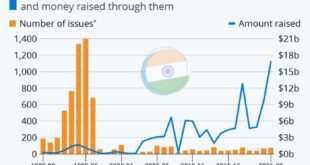Warburg Pincus entities sell $10.2 million in Ring Energy stock, a move that has sent ripples through the energy sector and raised questions about the future of the oil and gas company. This strategic decision, made by the renowned private equity firm, signifies a shift in their investment strategy and offers a glimpse into the evolving landscape of the energy industry.
The sale, involving a significant number of shares, has sparked discussions about the potential implications for Ring Energy’s future operations and financial performance. The market, ever-sensitive to such moves, has reacted with a mixture of intrigue and apprehension, as investors grapple with the implications of this transaction.
Warburg Pincus Entities
Warburg Pincus, a global private equity firm, has been a prominent investor in the energy sector, with a particular focus on the oil and gas industry. The firm has a history of investing in both upstream and downstream energy companies, with a focus on companies with strong growth potential and experienced management teams.
In the case of Ring Energy, Warburg Pincus’s investment reflects its belief in the company’s potential to capitalize on the growing demand for oil and gas in the United States.
Warburg Pincus Entities Involved in the Sale
Warburg Pincus entities involved in the sale of Ring Energy stock include Warburg Pincus LLC and its affiliates. These entities, acting as a group, have been significant shareholders in Ring Energy since their initial investment.
Nature of Warburg Pincus’s Investment in Ring Energy
Warburg Pincus’s investment in Ring Energy was a strategic investment designed to support the company’s growth and development. The firm’s investment helped Ring Energy acquire new assets, expand its operations, and improve its financial position. Warburg Pincus’s investment in Ring Energy reflects its belief in the company’s potential to capitalize on the growing demand for oil and gas in the United States.
Rationale Behind Warburg Pincus’s Decision to Sell its Ring Energy Stock
Warburg Pincus’s decision to sell its Ring Energy stock is likely driven by a combination of factors. One possibility is that the firm has achieved its investment objectives in Ring Energy and is looking to redeploy its capital into other investment opportunities.
Another possibility is that Warburg Pincus believes that Ring Energy’s stock is currently trading at a price that reflects its fair value and represents a good opportunity to realize a return on its investment.
Comparison to Previous Investment Activities by Warburg Pincus
Warburg Pincus has a long history of investing in the energy sector, and the sale of its Ring Energy stock is consistent with its overall investment strategy. The firm typically invests in companies with strong growth potential and experienced management teams, and it is not unusual for Warburg Pincus to exit its investments after a period of time to realize a return on its investment.
Ring Energy Stock Sale
Warburg Pincus Entities, a prominent investment firm, recently sold its stake in Ring Energy, a Texas-based oil and gas exploration and production company. This move signifies a shift in investment strategies and potentially reflects broader market trends within the energy sector.
Details of the Stock Sale
The sale involved the disposal of 10.2 million shares of Ring Energy stock, representing a significant portion of Warburg Pincus Entities’ holdings. The transaction was executed at a price of $10.00 per share, generating a total revenue of $102 million for the investment firm.
Impact on Ring Energy’s Stock Price and Market Capitalization
The sale of such a large block of shares by a prominent investor like Warburg Pincus Entities had a notable impact on Ring Energy’s stock price. Following the announcement, Ring Energy’s stock price experienced a decline, closing at $9.50 per share, reflecting a 5% drop from the previous day’s closing price.
This price decline directly impacted the company’s market capitalization, which is the total value of all outstanding shares. The decrease in share price resulted in a reduction of Ring Energy’s market capitalization by approximately $51 million.
Potential Implications for Ring Energy’s Future Operations and Financial Performance
While the stock sale does not directly impact Ring Energy’s operations or financial performance, it can indirectly influence the company’s future prospects. The decline in stock price may make it more challenging for Ring Energy to raise capital through future equity offerings, as investors might be hesitant to invest in a company with a declining share price.
Additionally, the sale could signal a lack of confidence in Ring Energy’s future growth prospects, potentially impacting its ability to attract new investors and secure financing for future projects.
Potential Impact on the Broader Energy Sector
The sale of Ring Energy stock by Warburg Pincus Entities could be interpreted as a signal of the investment firm’s outlook on the broader energy sector. While the sale itself does not necessarily reflect a negative view on the entire energy sector, it could indicate a shift in investment priorities towards other sectors or a preference for alternative energy sources.
This shift in investment focus could potentially impact the flow of capital into the energy sector, influencing the future growth and development of oil and gas exploration and production companies.
Market Context
The sale of Ring Energy stock by Warburg Pincus entities comes against the backdrop of a dynamic energy market grappling with several factors, including evolving energy demand patterns, geopolitical tensions, and the ongoing transition to cleaner energy sources. Understanding these market forces is crucial to comprehending the rationale behind Warburg Pincus’s decision and its potential implications for Ring Energy’s future.
Factors Influencing Warburg Pincus’s Decision
The decision by Warburg Pincus to sell its stake in Ring Energy could be attributed to several factors, including:
- Shifting Investment Strategies:Warburg Pincus may be adjusting its investment portfolio to align with its long-term strategic goals. This could involve prioritizing investments in sectors with higher growth potential or lower risk profiles compared to the oil and gas industry.
- Market Volatility:The energy market is highly volatile, influenced by factors like global economic conditions, geopolitical events, and the pace of the energy transition. Warburg Pincus might have perceived the current market conditions as unfavorable for Ring Energy’s prospects and opted to exit the investment.
- Valuation Concerns:Warburg Pincus may have held a different valuation for Ring Energy’s stock compared to the prevailing market price. This difference in valuation could have motivated the sale, especially if the fund anticipated a further decline in Ring Energy’s stock price.
Finish your research with information from Americas Carmart director buys $999,965 in company stock.
Key Market Trends and Their Impact on Ring Energy
The energy market is characterized by several key trends that can significantly impact Ring Energy’s performance:
| Trend | Potential Impact on Ring Energy |
|---|---|
| Rising Energy Demand | Increased demand for oil and gas could drive higher production and potentially boost Ring Energy’s revenue and profitability. |
| Transition to Renewable Energy | Growing adoption of renewable energy sources could decrease demand for fossil fuels, potentially impacting Ring Energy’s long-term growth prospects. |
| Geopolitical Tensions | Global geopolitical events, such as conflicts and sanctions, can disrupt oil and gas supply chains, impacting Ring Energy’s operations and profitability. |
| Environmental Regulations | Stringent environmental regulations could increase operating costs for oil and gas companies like Ring Energy, potentially impacting profitability. |
Potential Risks and Opportunities for Ring Energy
Ring Energy faces both risks and opportunities in the current market:
| Risk | Opportunity |
|---|---|
| Declining Oil and Gas Prices | Expansion into Renewable Energy: Ring Energy could explore investments in renewable energy sources to diversify its portfolio and mitigate the risks associated with fossil fuel dependence. |
| Increased Competition | Technological Innovation: Ring Energy could invest in advanced technologies to improve efficiency, reduce costs, and enhance its competitive position. |
| Environmental Regulations | Carbon Capture and Storage: Ring Energy could invest in carbon capture and storage technologies to reduce its environmental footprint and comply with regulations. |
Investment Implications: Warburg Pincus Entities Sell .2 Million In Ring Energy Stock

The sale of Ring Energy stock by Warburg Pincus entities could have several implications for investors, impacting investor sentiment and potentially influencing the future performance of Ring Energy stock.
Potential Impact on Investor Sentiment
The sale of a significant portion of Ring Energy stock by a major institutional investor like Warburg Pincus can be perceived as a negative signal by some investors. It might raise concerns about the future prospects of the company, particularly if the sale is seen as a sign of waning confidence in Ring Energy’s long-term growth potential.
However, it is crucial to consider the context and potential motivations behind the sale.
For example, if Warburg Pincus is divesting from Ring Energy as part of a broader portfolio rebalancing strategy, the sale might not necessarily reflect a negative outlook on the company’s future performance.
Potential Future Performance of Ring Energy Stock
The sale of Ring Energy stock by Warburg Pincus could have a mixed impact on the stock’s future performance. While the sale might initially lead to a decline in the stock price due to negative sentiment, the long-term performance of the stock will depend on various factors, including the company’s financial performance, industry trends, and overall market conditions.
For instance, if Ring Energy continues to generate strong earnings and maintain a solid track record of growth, the stock could potentially recover from any initial decline and even outperform in the long run.
Potential Investment Strategies, Warburg Pincus entities sell .2 million in Ring Energy stock
Investors considering investing in Ring Energy stock should carefully analyze the company’s fundamentals, including its financial performance, debt levels, and growth prospects. The sale of stock by Warburg Pincus should be considered as one factor among many in the investment decision-making process.
| Investment Strategy | Description | Potential Outcomes |
|---|---|---|
| Buy and Hold | Invest in Ring Energy stock and hold it for the long term, expecting potential growth and appreciation. | High potential for returns if the company performs well, but also carries the risk of potential losses if the company underperforms. |
| Short-Term Trading | Engage in short-term trading of Ring Energy stock, aiming to profit from short-term price fluctuations. | Higher potential for quick gains, but also carries a higher risk of losses due to volatility and unpredictable market conditions. |
| Wait and See | Monitor the company’s performance and market sentiment before making an investment decision. | Allows for a more informed decision, but also carries the risk of missing out on potential gains if the stock price rises significantly before making a decision. |
Closing Summary
The sale of Ring Energy stock by Warburg Pincus entities underscores the dynamic nature of the energy market and the strategic decisions that drive investment strategies. This move, coupled with the current state of the energy sector, presents both opportunities and challenges for Ring Energy and its investors.
As the company navigates this new terrain, its future performance will be closely watched, and the impact of this transaction will continue to unfold in the coming months and years.
Question & Answer Hub
Why did Warburg Pincus sell its Ring Energy stock?
The exact reasons for Warburg Pincus’s decision to sell its Ring Energy stock are not publicly disclosed. However, potential factors could include changes in market conditions, strategic realignment, or a shift in investment priorities.
What is the impact of this sale on Ring Energy’s stock price?
The sale of a significant number of shares by a major investor like Warburg Pincus can influence the stock price. The impact can vary depending on the market sentiment and the overall financial health of the company.
What are the potential risks and opportunities for Ring Energy in the current market?
Ring Energy, like other oil and gas companies, faces both risks and opportunities in the current market. Risks include volatile oil prices, regulatory changes, and competition. Opportunities include potential growth in demand for oil and gas, technological advancements, and expansion into new markets.
 CentralPoint Latest News
CentralPoint Latest News




